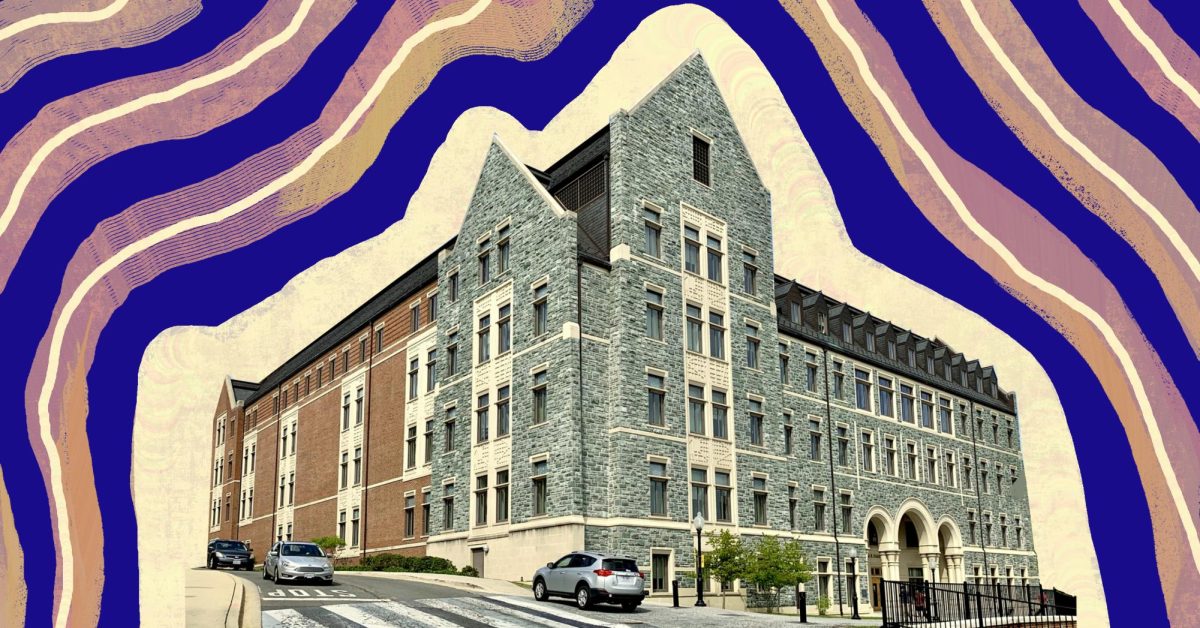Students at Georgetown University are no strangers to the ways politicians play dirty. Whether it’s student government election controversy, city council bribery arrests or the latest news from Congress, one can be sure to hear Georgetown students touting their opinions on the latest scandal. However, this summer, while students were tucked away at home or at internships, separated from the Georgetown bubble, a battle on the homefront was bubbling over. At its center? Bagels.
Call Your Mother Deli, a local bagel shop with 13 locations across the Washington, D.C.-Maryland-Virginia area, has served the Georgetown neighborhood at 35th and O Streets NW since 2020. On weekend mornings and early afternoons, neighborhood residents and students flock to its signature pink building and lines spill down the street.
Kishen Anand (SFS ’27) said Call Your Mother is a classic student spot, often providing breakfast for lawn picnics and community building.
“I definitely feel like it’s like a staple in the Georgetown community,” Anand told The Hoya. “It’s just so quintessential to the Georgetown experience.”
However, since its opening, some neighbors have cited zoning violations, saying the store functioning as a prepared food store causes a disturbance to the neighborhood.
Historically, the wooden rowhouse Call Your Mother now occupies has been used as and classified under zoning law as a corner store. Under D.C. zoning laws, a corner store in the Georgetown neighborhood cannot operate within 750 feet of a mixed-use or commercial zone. However, Call Your Mother sits around 600 feet from the 1200 block of 36th St. NW, which contains Wisemiller’s Deli, The Tombs and 1789 Restaurant & Bar and which D.C. classifies as one such mixed-use zone. This proximity means the city required Call Your Mother to acquire a corner store variance, a formal exception to this zoning law which allows them to operate.
Call Your Mother’s status as a corner store comes with a host of limitations: corner stores cannot cook food. What exactly qualifies as cooking is disputed: Call Your Mother initially argued that they only reheat their sandwiches, rather than preparing them in house.
In light of this, Call Your Mother is seeking a special exception for the sale of prepared foods, a request to deviate from the zoning laws under specific criteria, which the Board of Zoning Appropriations (BZA), the body responsible for any zoning appeals, must approve. The BZA typically solicits the input of the local Advisory Neighborhood Commission, ANC 2E, the lowest-level government body representing residents of the Georgetown, Burleith and Hillandale neighborhoods.
Both special exceptions and area variances have a requirement that the business’s activities are not likely to become “objectionable,” which would involve creating a disturbance to the neighbors. But some of Call Your Mother’s neighbors have argued that such a situation is playing out.
Georgetown resident Melinda Roth, who led the initial lawsuit against Call Your Mother, testified at a June 12 meeting of the BZA that Call Your Mother’s success has caused them to grow in an unsustainable way due to its lack of seating and relatively small space, making it a better fit for a different location.
“We want them to continue to be successful, but as you’ll hear, we want them to be successful in the right place,” Roth said at the meeting. “And not on a block in a residential area that is ill-equipped to handle the consequences of their great success.”
Joe Massaua (SFS ’25), an elected student commissioner for ANC 2E, said that the issue is a question of the neighborhood’s identity and what its future will look like.
“I guess it’s a question of how integrated is a bagel shop into a neighborhood, you know, and how welcoming is a neighborhood to that and how welcoming is the store to that?” Massaua told The Hoya. “I think it’s a bigger question than just pure zoning.”
Neighborhood Objections
Controversies over Call Your Mother’s zoning have existed since before it opened its doors in Georgetown.
In 2019, a group of neighbors sued the BZA in the U.S. Court of Appeals after the store announced its intention to open the Georgetown location, citing the zoning problems. The U.S. Court of Appeals dismissed the case and referred it to the BZA, who then sent it to the ANC to make a recommendation based on neighborhood input.
Although the BZA recommended that Call Your Mother open while seeking zoning relief, Call Your Mother owner Andrew Dana said that the neighbors opposed to its opening have not given the business a chance.
“The people that are opposing us, they appealed the case before we even opened, right?” Dana told The Hoya. “So they basically made up their mind that they did not want us there.”
However, ANC 2E vice chair Topher Mathews said that the problems that opposing neighbors foresaw did end up coming to fruition.
“A lot of these neighbors that are objecting would say that this was completely foreseeable,” Mathews told The Hoya. “They had absolutely said all along, this is exactly what was gonna happen. And I think they’re probably correct, you know, this store was going to be immensely popular.”
The ANC is a purely advisory committee, and its monthly votes cannot directly determine governing decisions. However, the BZA considers their recommendations with “great weight” and sees the ANC as reflecting the opinions of its constituents.
After the BZA met in June in an 11-hour Zoom meeting to consider Call Your Mother’s case for a special exception, hearing from a variety of perspectives on the issue, they decided to bump the case to ANC 2E to garner further neighborhood input.
The main issues neighbors point to are Call Your Mother customers’ trash disposal and its lack of outdoor seating, which means customers often sit on curbs or front stoops of residences to eat their bagels. Other issues mentioned include delivery timing, illegal parking and noise.
Neal Emad, who owns the house directly next to Call Your Mother, said the houses on the block serve as de facto seating for customers.
“What’s happening is they’re sitting all over other stoops all over the place, and I could show you tons of pictures,” Emad said at the June ANC meeting. “Our streets are becoming an eatery for them.”
Emad said neighbors have complained that customers often leave trash on the streets or dispose of it in private trash cans.
“There’s trash all over the place and it’s causing problems,” Emad said.
Mathews said he sympathizes with residents’ concerns over customers crowding neighborhood streets.
“The key thing that is causing them a problem is that it’s pretty clear, in my opinion, that the way they operate is creating an objectionable condition for some neighbors,” Mathews said. “Just to have so many people out on the sidewalk every Saturday and Sunday in a fully residential neighborhood, I think that’s fair to consider that to be objectionable.”
Reilly Lowell (SFS ’25), a longtime Georgetown resident and current student who lives across the street from Call Your Mother, said although she has not experienced this problem on her porch, she is aware that it has been an issue historically.
“I can imagine that those are problems when they do occur,” Lowell told The Hoya. “I have not seen many people sitting on the stoops in my years living here, or at least in the past two years. I know it was a problem in the past.”
However, Lowell said that at the end of the day, she feels the shop’s contribution to the neighborhood is greater than the problems it causes.
“They are just so sweet and so fun to talk to, great community and very welcoming,” Lowell said. “It’s more than just a bagel. Quote me on that.”
During the BZA meeting, neighbors on opposing sides traded photos of each other’s trash to prove or disprove Call Your Mother’s contribution to neighborhood trash violations.
In advance of their June BZA meeting, Call Your Mother stepped up measures aimed at stemming the neighbors’ concerns — hiring a “neighborhood ambassador” who manages lines, picks up trash and ensures customers do not use front stoops for seating. Call Your Mother also pays for public trash pickup on the block. The question now is if they have done enough to satisfy the BZA’s standards for potential objectionable behavior.
Valli Pendyala (SFS ’27) said that these measures have been effective for quelling the seating problem.
“I’ve gone when it’s literally packed and the line’s out the door, and I’ve never seen people sitting on stoops, because the staff discourages that very heavily, like they have signs everywhere.” Pendyala said. “If they see people, they make sure to tell them that they can’t sit there. So I feel like that issue is not really well founded.”
Dana said that he is always open to further conversation with neighbors about their concerns, and has reached out to the neighborhood through flyers and email lists.
“All we’ve ever asked is that the neighbors who oppose us come in and sort of sit at the table with us, and let’s chat about it and find solutions,” Dana added. “And they’ve never agreed to sit down and hash it out.”
On Sept. 3, ANC 2E voted in support of BZA approving the cornerstore variance, but were undecided on the special exception; the ANC will support the BZA in approving the exception if conditions require Call Your Mother to further address concerns of adverse impact on residents. The BZA will meet on Sept. 24 to make the ultimate decision.

Expansion
One of the biggest complaints throughout the neighborhood is the lack of available seating in front of Call Your Mother, resulting in a push for Call Your Mother to expand. In order to be permitted to have tables in front of a restaurant, the District Department of Transportation must approve the application, an often lengthy and difficult process.
The neighborhood has absorbed the overflow from this in many ways, whether through customers sitting on front stoops or using the seating at Coffee Republic, a coffee shop sitting across 35th Street from Call Your Mother.
Coffee Republic owner Sean Flynn said that Call Your Mother’s functioning as a corner store has a real impact on his business, as customers regularly take over Coffee Republic seating.
“We’ve always kind of had an issue with that burden and a lot of our customers will come in and, you know, Call Your Mother customers are sitting at tables eating, and it takes their place of being able to sit and have a coffee and chat,” Flynn told The Hoya.
Flynn also claims that Call Your Mother’s lack of bathroom facilities has caused customers to use his restrooms, more than doubling his expected costs of necessary bathroom equipment.
“The problem is that the zoning was there for a reason, and the reason that that zoning was in place is because it can impact neighbors and other businesses,” Flynn said.
Dana and Flynn both said that they considered an agreement under which Call Your Mother would rent some of Coffee Republic’s seating, but ultimately Flynn decided against it, citing financial and liability concerns.
Massaua said that more seating — either through outdoor tables or an expansion of the restaurant — is essential to solving many of the neighborhood’s problems.
“Ideally I would like to see Call Your Mother invest in outdoor seating,” Massaua said. “If they can’t get outdoor seating permitted, which they likely wouldn’t be able to, I would like to see them, do they own the space above them or the basement. There’s a way to augment the store so that it can handle the customer load.”
Currently, Call Your Mother rents its space on the first floor of the building, but the top floor is leased as an apartment. The building is currently listed for $1.9 million.
Flynn said that for a period over the summer, he and Dana had preliminary discussions about Call Your Mother potentially moving to the Coffee Republic space, a conversation he said he was open to. However, those conversations have not gone further.
Dana told The Hoya that they currently do not have plans to either buy the Call Your Mother building or lease the Coffee Republic building.
“If the upstairs apartment ever becomes available in the building, we’ll think about if there’s something to be done there,” Dana said. “We’ll continue to think creatively in the neighborhood and see where we can slide some seats.”
Georgetown’s Future
The debate over Call Your Mother reflects broader concerns in the Georgetown neighborhood about growth versus residents’ privacy.
“Georgetown is a federal historic neighborhood, so with that comes a lot of visions about what the neighborhood should be, how the neighborhood has been, and there’s a rigorous commitment to history and aesthetic architecture,” Massaua said.
Neighbors have also had disagreements over life-size Transformer sculptures on one front porch — statues which still stand on Prospect Street despite multiple denied permits.
Residents have also opposed sidewalk extensions, known as streateries, on Wisconsin Avenue and M Street.
The Georgetown Business Improvement District, a coalition of business owners who collaborate on commercial and community improvement, have pointed to the success that these extensions have in increasing space for restaurants, while groups like the Georgetown Coalition for Public Spaces and Citizens Association of Georgetown, a non-profit organization that represents the interests of residents in the neighborhood, say they are poorly maintained, create trash that attracts rats and are generally an eyesore.
Mathews, who has frequently dealt with zoning concerns as a commissioner, said that the phenomenon of NIMBYism — short for “not in my backyard” — takes hold frequently in Georgetown as residents worry that any changes to the neighborhood’s historic character will result in property values decreasing.
“It does reflect the broader dynamics of NIMBYism that are present in Georgetown and questions of real estate and questions of home prices,” Mathews said.
Pendyala said that such the desire to keep Georgetown a quiet, residential neighborhood puts it at odds with the vibrant student and commercial culture.
“We have a lot of similar conflicts about student housing, parties, and there’s just a general tendency to view Georgetown, but they run as, like a quiet residential, mini suburb, by residents, which puts it in conflict with the school.”
Mathews said that neighbors must decide if their desire for neighborhood communal gathering spots is more of a priority than the peace and quiet of their streets.
“It’s kind of a balancing act,” Mathews said. “That’s the heart of NIMBYism, basically, is that you agree that something should be somewhere but you don’t want it in your exact backyard.”
Lowell said that despite being heavily residential, the hustle and bustle of Georgetown — including Call Your Mother — is a natural part of the neighborhood.
“At the end of the day, we’re living in a city, and Georgetown is a shopping center,” Lowell said. “That’s just kind of what you sign up for when you live in a city and you’re in the neighborhood.
Michael Scime contributed to reporting on this article.








